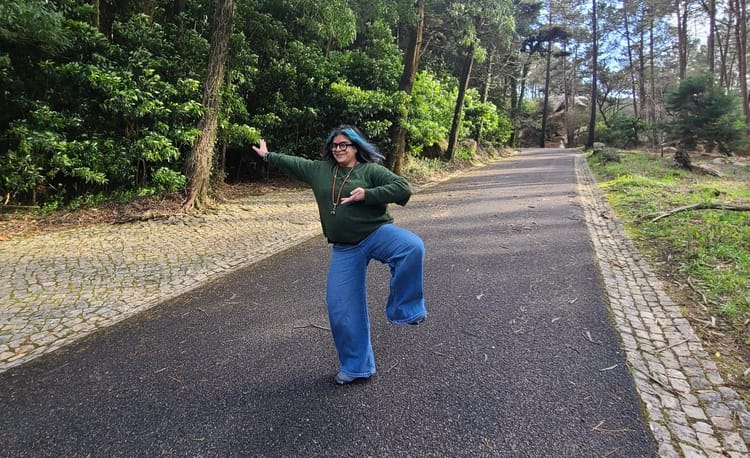Respect your gifts. Elevate your life.

When Sid and I first got together, he would remark that I was weird for not being close to my family. He comes from a large, close-knit (too close, if you ask me, LOL) family where second and third cousins grew up as siblings. They have stood by each other through hell and high water. Christmases are vibrant like weddings. In contrast, my family is small and fractured. The hullaballoo of resplendent celebrations has given way to insipidity. He is excited to go home to India, but the thought itself gives me anxiety.
Sid grew up internalizing that families are close. Everyone around him had that experience, and he assumed that anyone who didn’t was an outlier. A beautiful gift, but it also made him less compassionate about the plight of people with a different life experience.
I told my mother-in-law that I was grateful for the wonderful childhood they had given Sid, but I was disappointed that it had made him unempathetic. She chided him and reminded him that it was a gift. Over the years, moving to the West, mainly getting out of his bubble, introduced him to people from different cultures and walks of life. He began to see what he had with a new perspective. He is much more patient and compassionate with me now.
A few months ago, I realized that I too took my gifts for granted. My gift is the ability to hold space for pain and suffering with compassion and non-judgment. I can be present and validating, and can give fruitful advice when asked. It is easy and almost my default response. It always surprises Sid when people we have met only once reach out to me for support or advice on a wide range of things.
The ease I experience in being compassionate has led me to normalize it as commonplace. As Sid did with the family thing, I too expected that everyone was naturally compassionate. Sid does not, at least did not in the early years, do emotions, or conflict. A complaint I had towards him was, “You are never there for me when I need you.”
My assumption that everyone is naturally compassionate led me to take it personally. I thought that Sid was CHOOSING not to do it for me. This was hard because it made me resent him and built on my stories* of how I did not deserve to be loved.
I used to wonder why my peers were busy in their therapy business but I was not. As many answers have emerged for me during meditation, this one did too. I realized that I do not take my power seriously. I do not appreciate the impact I have on the lives of others. I take for granted my skill of connecting with people, being with their suffering, and helping them transform their pain. I also believe that I am not unique or special. Not only did my business suffer, but it also meant I was constantly dissatisfied when others could not meet my needs. I felt alone and let down. I felt ashamed that I had to pay professionals to support me.
As Sid is surrounded by people who like him have supportive families, I too was surrounded by compassionate and loving therapist friends, and being with them I normalized my talents. I had to zoom out and view the wider world to surmise that my colleagues and I are the rarer breed.
The realization that my therapy skill is precious and not-so-common allowed me to release others from the pressure of meeting me exactly as I needed it. I can be compassionate towards those who cannot give me the support I need - after all, it is hard to meet the depth of what I have been through. It also made me respect myself and my work. Since then, I have put more effort into marketing my business, and it is flourishing. I am doing work that I love and I am proud of.
Learning about my gifts also freed me from the need to be good at everything. After all, I can have some gifts, and others will have different ones. I can pick a lane and stick to it. Even my work became more nuanced. As a therapist, I used to feel the pressure of being trained in trending therapies. I am leaning toward my gift - Buddhism and yoga-inspired counseling for a global secular audience. It is saving me time, money, and energy. I know my peers will excel at other modalities, but I can say with pride and humility that I am one of the best mindfulness therapists in the field today.
It is hard to say it out loud because of years of sublimating myself to the point of nullifying my gifts - socialized parts come out loud criticizing me for being cocky. I look at them with love and say, “But my dear, you simply are that good. Even if you don’t believe it or it makes you uncomfortable.” These parts look at me in awe. My self-assurance reassures them that I am competent and can be trusted.
Once this process started, I could not stop. It helped me to take my writing seriously. I am not the best writer out there, AND I am forced to accept that my writing is relatable and accessible to a wide range of people. It normalizes being human and a work-in-progress. I am writing my book with a newfound joy and enthusiasm as a result.
I am more comfortable with the idea that I am frikkin awesome. I am grateful for my gifts and more mindful of how I walk with them in this world.
__
Reflection prompts:
- What are your gifts? What are you good at? What do you cherish in your life?
- How have you benefited from this gift? How have others benefited from this gift? How has this gift thwarted you/others?
- What would change for you if you understood that what you have is special? How would you treat yourself? How would you treat others?
__
Explanation of key terms:
- Stories* - Internalized stories refer to the narratives, beliefs, and interpretations that people develop about themselves, others, and the world based on their life experiences.

Member discussion